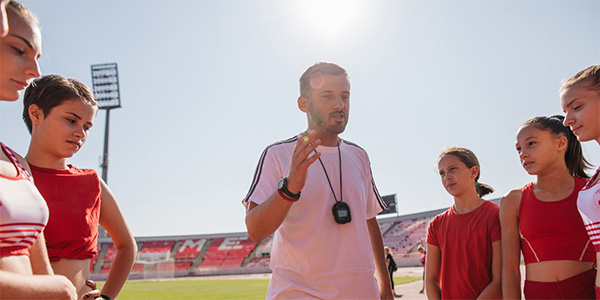
How do your athletes respond to constructive criticism?
Why do some athletes reject corrections or constructive feedback from their coaches?
Athletes are afraid of constructive criticism for several reasons:
- They feel they are negatively being judged.
- The criticism confirms some self-doubt they have about themselves.
- They have perfectionist standards.
- They fear they are letting others down.
- They are given feedback in an aggressive or disapproving tone.
Some athletes see the criticism as a list of everything they do wrong. In these instances, they dismiss or ignore feedback. Other athletes view criticism as constructive. They see it as advice about how to improve their game.
Accepting and using feedback is a critical mental skill for athletes. When kids develop this skill, they won’t feel attacked when coaches give them feedback. It will feel more like a suggestion about improving their performance.
However, not every coach or parent is skilled in providing feedback effectively. That means young athletes must figure out how to find the message in the criticism.
Are Your Athletes Receptive To Criticism?
Here’s a practical example from the Boston Celtics. The Celtics had built an 18-point lead against the Golden State Warriors in the first half of Game 3 in the 2022 NBA Finals.
Boston built the lead by playing tough defense and controlling the ball on offense. The Celtics became reckless with the ball, committing foolish turnovers and allowing the Warriors to climb back into the game.
In the fourth quarter, Boston head coach Ime Udoka was fuming during a timeout. After the timeout, the Celtics collected themselves, regained their composure, and eventually won the game 116-100.
After the game, Boston guard Marcus Smart commented on how the team acted in response to the coach’s feedback.
“You want to know what you’re doing wrong so you can fix it,” said Smart. “You can’t fix (anything) if you don’t know what the problem is. So we definitely appreciate his honesty and his openness.”
Criticism can feel like an attack, but often kids can find a message in it and disregard the negative tone.
It’s normal for sports kids’ defense mechanisms to kick in, but criticism can be helpful. Rather than throwing out the message due to the negative delivery, kids should grab hold of the parts of the feedback that can help their game.
When young athletes receive criticism, they should ask themselves three questions:
- What is the message?
- How does this message help me?
- How sill I use this feedback to improve my game?
They should then:
- Communicate with the person giving the feedback. They should ask for clarification about the message if they’re confused.
- Challenge their defensiveness. They should try to understand why they don’t like receiving feedback.
- Focus on the message itself, not how the message is delivered. The message is more important than the delivery.
- Ask themselves how they can apply it to their game and what to do.
Help your young athletes have fun and stay in sports!

You can benefit from our 15-plus years’ of work in sports psychology and sports parenting research. Now, you can tap into our secrets to sports success through a cutting-edge, 14-day program that helps young athletes overcome the top “mental game” challenges that sports parents face—and the top challenges young athletes face. In our 14-day program, you and your young athlete will learn just what it takes to cultivate confidence, focus, and composure in sports!
Through our extensive research, we’ve discovered that the parents of top-performing, happy, young athletes know how to support their kids in sports. These parents understand just how to:
- Communicate with coaches
- Boost their kids’ confidence on game day
- Help kids stop worrying about what others’ think
- Teach kids no one is perfect
- Give kids appropriate feedback after defeat
- Free kids to trust in their own abilities, and
- Help kids focus on what’s most important….
- And more!
